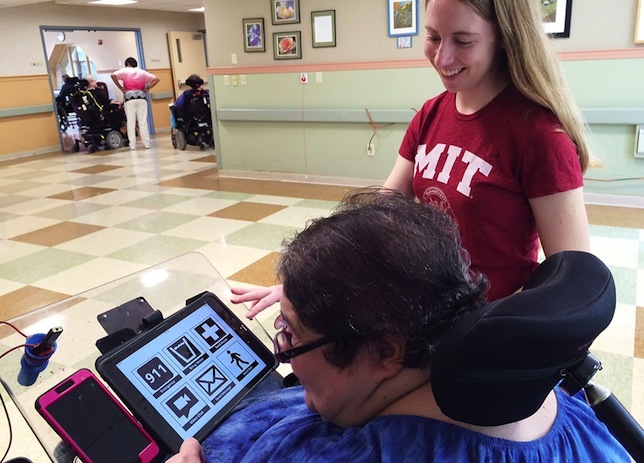MIT Student App Helps Long-Term Care Residents Communicate
- By Dian Schaffhauser
- 05/18/15
A small team of MIT students has worked with people at a nearby assistive living
facility to create an iPad app that allows the residents to communicate their needs and emergencies with the nursing staff.
InstaAid, as the app is called, is primarily the
creation of MIT senior Beth Hadley and The Boston Home resident Margaret Marie.
The effort began last fall when Hadley and classmates senior Laura D'Aquila and junior Tanya Talkar began collaborating with Marie on a
project for a course in the "principles and practices in assistive technologies."
The residents at the home have call buttons in their apartments that allow them to seek help from on-site nurses. However, most of them have
limited mobility due to conditions such as advanced multiple sclerosis or other progressive neurological diseases. That makes reaching the
buttons a challenge.
"I had been thinking for a while about how antiquated our nurse call system was, and how it is tied to a single place in our room, which
makes it so ineffective, especially when people are not in their bed. And we're an active group, so often people are not in their bed, so
people need to be able to access help when they're out and about," said Marie.

Because so many of the residents use iPads attached to their wheelchairs, Marie's idea was to create an app to replace the call button.
The first iteration was developed during the MIT course. But Hadley continued to improve the app as her senior thesis project, testing and
revising several prototypes with feedback from the home's residents and staff. Now InstaAid is available as a free download through the iTunes
store.
The program has two interfaces, one for residents, who can make an emergency call, request a nurse, do a video chat, send a message, ask
for aid or ask for water. Nurses can view requests and respond appropriately.
The code that Hadley and her fellow students developed is open source, and she anticipates that the software could be used in other
facilities. The interface is designed to accommodate for visual, motor and cognitive challenges.
Since its adoption in December, InstaAid has become the preferred communication mechanism for residents. "Communication between caregivers
and residents can be a challenge," said Don Fredette, adaptive technology specialist at The Boston Home. "The application gives residents piece
of mind that anywhere where they have their iPad with them, they can make their needs known."
"For me, this project helped illuminate the vast difference between developing a prototype, and actually introducing a new piece of
technology to a community," said Hadley "It's this kind of project that reminds me why I love technology so much, and why I love to share my
technical skills with others."
Added Marie, "I'm a person who has lots of ideas, but I often can't put them into practice without help...Sometimes I can, but usually I
need some help. But with [the MIT team], I felt I could be an ideas person because I had a team who could implement the idea. It gave me a lot
of confidence in being able to think something through and be able to implement it. It's great to feel like you are part of a team even though
you physically can't do something — it's wonderful."
About the Author
Dian Schaffhauser is a former senior contributing editor for 1105 Media's education publications THE Journal, Campus Technology and Spaces4Learning.